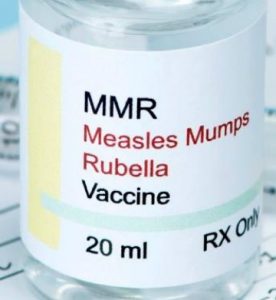The number of measles cases reported to date in the US has topped 700 cases, according to the Centers for Disease Control and Prevention (CDC).

From January 1 to April 26, 2019, 704 individual cases of measles have been confirmed in 22 states. This is the greatest number of cases reported in the U.S. since 1994 and since measles was declared eliminated in 2000.
Today, Director, National Institute of Allergy and Infectious Diseases at the National Institutes of Health, Anthony S. Fauci, M.D., CDC director Robert Redfield, M.D. and acting Food and Drug Administration (FDA) Ned Sharpless, M.D. released statements on vaccines.
Vaccines are essential for protecting children against infectious diseases such as measles, mumps, rubella and whooping cough. Many of these diseases are largely forgotten in our country. Before vaccines became available, however, these diseases exacted a huge toll. For example, before the measles vaccine was licensed in 1963, the virus infected at least 2 million Americans a year, causing 500 deaths and 48,000 hospitalizations.
It may be upsetting for parents to see their babies or young children receive several vaccinations during a medical visit. However, these shots are necessary for protection from multiple dangerous—and sometimes deadly—diseases. Vaccinations typically cause only mild side effects, such as redness or swelling at the injection site; serious side effects are very rare. The public health benefits of vaccination far outweigh the possible side effects.
When children are vaccinated, their immune systems develop infection-fighting antibodies to protect them from contracting the targeted disease if they are exposed to it later in life. The full course of recommended childhood vaccinations, largely completed for most children by age 6, not only protects the vaccinated child but also contributes to a larger umbrella of protection known as “herd immunity.” By doing so, it helps prevent the spread of disease to those who cannot be vaccinated, including newborns who are too young to be vaccinated, and people with compromised immune systems, who cannot effectively develop antibodies to fend off disease.
Many diseases against which children in the United States are immunized are rare in this country because of mass vaccination programs. However, these diseases are still found in other parts of the world and can be reintroduced into the United States by travelers, and then spread within our communities among people who have not been vaccinated. The current resurgence of measles, a highly contagious and potentially deadly disease that was declared eliminated in the United States in 2000, is a painful reminder of the need for vaccination.
Parents and caregivers, please vaccinate your children to protect them, as well as friends, family, and community members who cannot be vaccinated.
Redfield’s statement was as follows:
As CDC Director and as a physician, I have and continue to wholeheartedly advocate for infant immunization. More importantly, as a father and grandfather I have ensured all of my children and grandchildren are vaccinated on the recommended schedule. Vaccines are safe. Vaccines do not cause autism. Vaccine-preventable diseases are dangerous.

More than 94% of parents vaccinate their children to protect them from the harmful effects of measles and other vaccine- preventable diseases. CDC is working to reach the small percentage of vaccine-hesitant individuals so they too understand the importance of vaccines. It is imperative that we correct misinformation and reassure fearful parents so they protect their children from illnesses with long-lasting health impacts. Roughly 1.3 percent, or 100,000 children, in this country under the age of two have not been vaccinated making them vulnerable to the current measles outbreak.
I call upon healthcare providers to encourage parents, and expectant parents, to vaccinate their children for their own protection and to avoid the spread of vaccine-preventable diseases within their families and communities. We must join together as a Nation to once again eliminate measles and prevent future disease outbreaks.
“As we head into National Infant Immunization week, I want to take the opportunity to underscore the public health importance of immunizations. One of my priorities at FDA is to continue to support the agency’s efforts to reinforce the rigorous and robust process we use to ensure the safety and effectiveness of vaccines that prevent infectious diseases like influenza and measles,” said Ned Sharpless, M.D., FDA Acting Commissioner.
“I’m horrified by the current outbreaks of measles – a disease we thought we had eliminated in the United States in 2000. With a vaccine that is highly effective, this life-threatening infection is now making a tragic comeback, in part because of vaccine avoidance. And, unfortunately, measles is not the only disease that is threatening to make a resurgence. The best way to prevent such diseases is to vaccinate against them.
“I want to reassure the American public that these vaccines have been determined to be safe and effective and dispel the continued misconception that they are associated with the development of autism. We remain dedicated to continuing our important work alongside our federal, state, and local partners to monitor the safety and effectiveness of our current vaccines, encourage vaccinations against preventable diseases, and support the development of novel vaccines to address emerging threats to public health.”
Measles in Ukraine: 100,000 cases and 35 deaths since summer of 2017
NYC measles outbreak: 92 percent of children diagnosed were unvaccinated
California measles: Vaccinations critical for overseas travel


